Ghosts outside my window
(AFP Photo / Christophe Archambault)
BANGKOK, February 6, 2015 – How do you write a news story about ghosts without sliding into mockery? How do you describe the deep-seated terror they inspire in much of Asia - to a foreign audience for whom the word mostly conjures up childish Halloween costumes or the theme tune to “Ghostbusters”?
Are ghosts an “offbeat” topic – the label AFP uses for stories seen as quirky, from a French couple trying to name their child “Nutella” to a hearse losing a body in the middle of the road in South Africa?
When I arrive in Bangkok 18 months ago, it’s one of the first things that strikes me, the way ghosts infiltrate everyday life here.
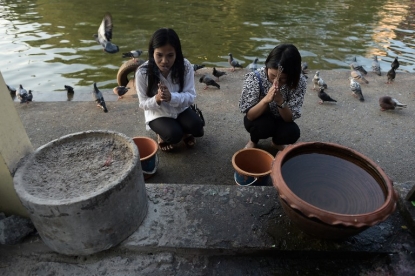
Women pray before releasing fish into a canal to earn 'merit' at a Bangkok shrine on January 15, 2015
(AFP Photo / Christophe Archambault)
What am I supposed to do when the caretaker starts chasing away ghosts with a machete, in broad daylight, just outside my window? “You need to move house - or at least have Buddhist monks come and perform a ceremony,” I am told. And when a junkie is found dead of an overdose one morning on the corner of my street, covered in tattoos and amulets? “His ghosts will haunt the neighbourhood.”
After months of seeing, in my private life, ghosts offered up as a normal explanation for all manner of things - by otherwise quite reasonable people - it starts to chip away at my certainties.
Spirit houses
What is going on inside the heads of these office workers I share my commute with every morning? You can easily picture them on the streets of Paris or New York – except for the fact they all bow to the “spirit houses” protecting the tower blocks where they work, before stepping inside.
To try to help me find some answers, a Thai colleague at AFP, named Thanaporn but everyone calls her Neung, brings in a DVD one day of a film called “Nang Nak”, directed by Nonzee Nimibutr. It tells of a love story between a man who returns from war to resume married life with his wife, Nak, without realising that she died in childbirth and that the woman by his side is a ghost.
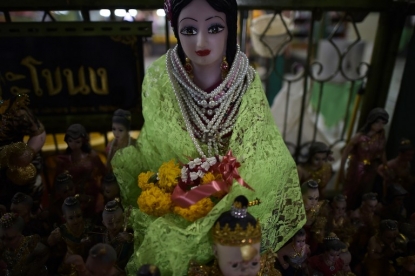 A statue of the famous Thai ghost 'Nak', at a Buddhist temple in January 2015 (AFP Photo / Christophe Archambault)
A statue of the famous Thai ghost 'Nak', at a Buddhist temple in January 2015 (AFP Photo / Christophe Archambault)The story of Nak, known to all Thais from childhood and adapted many times on screen, gave me a first key towards understanding that, for people here, ghosts are a fundamental part of the grieving process, such an abstract thing in the West.
“The living create these beliefs out of love for the departed,” is how it is later explained to me - when I finally decide to write a story about this - by Kapol Thongplab, the host of a nightly chat show whose listeners call to share their ghost stories on air.
What I love about Thailand is how the light sometimes mixes with the serious – in ways that can be totally incongruous. A mélange that is difficult to reflect in our regular news coverage of the kingdom’s tumultuous politics.
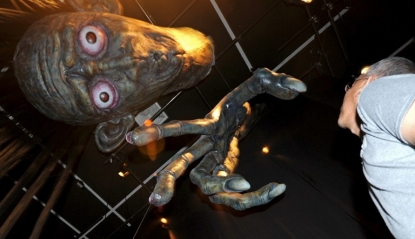 A mock-up of the Thai ghost 'Pret' at the Spirits Exhibition in Bangkok in 2010 (AFP Photo / Pornchai Kittiwongsakul)
A mock-up of the Thai ghost 'Pret' at the Spirits Exhibition in Bangkok in 2010 (AFP Photo / Pornchai Kittiwongsakul)When pro-coup demonstrators seize the seat of government last year, of course AFP runs a news alert. Then a few hours later, they scatter again like a flock of sparrows, leaving no clue as to the meaning of their merry picnic on the official lawns – and the poor Western journalist, all geared up for a violent overthrow of the regime, utterly at a loss.
Vampire blood
Whether you are dealing with a government ouster or with zombies, in Thailand there always comes a point where serious-mindedness starts to show cracks, and things topple into the burlesque.
At the ghost-themed Bangkok bar owned by Kapol, the dishes are served up in little coffins. The chat show host explains to me, over an alcohol-free cocktail of “vampire-blood”, that believing in ghosts – as he firmly does – doesn’t stop him having a laugh.
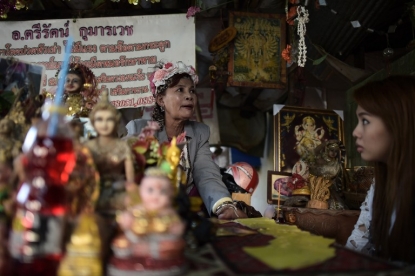 A fortune teller at a Bangkok shrine to the ghost 'Nak' on January 15, 2015 (AFP Photo / Christophe Archambault)
A fortune teller at a Bangkok shrine to the ghost 'Nak' on January 15, 2015 (AFP Photo / Christophe Archambault)Soon enough I find myself watching a Thai box-office hit called “Pee Mak” – a comic remake of the story of Nak and her husband, Mak, which pokes fun at the national obsession with ghosts.
My colleague Neung and I decide to head to a Buddhist temple in Bangkok, built on the spot where Nak is said to have lived in the 19th century. Young Thais come here to pray to be exempted from military service. On the eve of big lottery draws, the temple stays open all night, since Nak is thought to reveal the winning numbers.
The atmosphere is intense, the place busy with fortune-tellers claiming to channel Nak’s spirit, and women selling offerings to her.
We speak to an elderly fortune-teller, beautifully photographed a few days later by my colleague Christophe Archambault. She pulls a statuette of Nak from her handbag, wrapped like a precious relic.
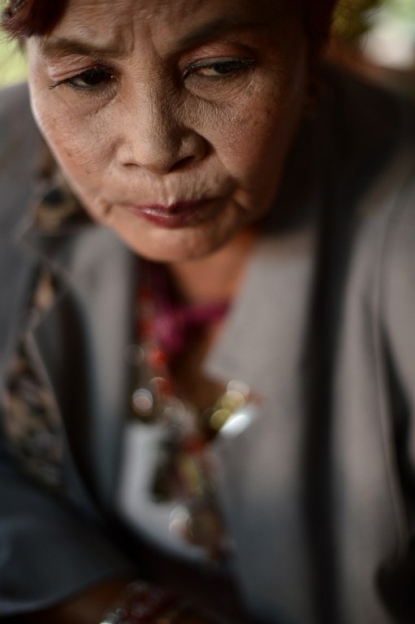 A fortune teller at a Bangkok shrine to 'Nak' on January 15, 2015 (AFP Photo / Christophe Archambault)
A fortune teller at a Bangkok shrine to 'Nak' on January 15, 2015 (AFP Photo / Christophe Archambault)We talk to worshippers come to pray to Nak. “I believe in her and I believe in ghosts,” says a striking young woman, here to thank the spirit for curing her sick baby.
I ask her - with Neung translating – if she shares the widespread belief that ghosts cause traffic accidents. Holding her child close to her chest, she answers “yes”, as puzzled by my question as if I had just landed from Mars.
Go with the flow
I feel strange, as if I am floating, surrounded by these people releasing little fish and toads brought from the temple vendors, into a nearby canal. I allow myself to go with the flow, choosing an offering of little eels. Neung and I release them in the canal, after lighting three incense sticks each.
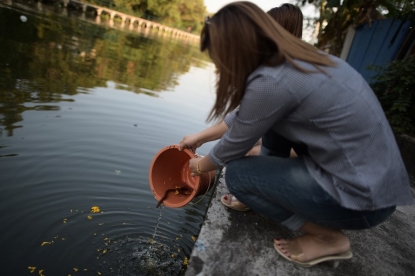 Releasing fish into a canal to earn 'merit' at a Bangkok shrine to 'Nak' on January 15, 2015 (AFP Photo / Christophe Archambault)
Releasing fish into a canal to earn 'merit' at a Bangkok shrine to 'Nak' on January 15, 2015 (AFP Photo / Christophe Archambault)The next day, I find I am torn over how to write this story.
I know I need to keep a proper, journalistic distance from my subject, but I am fascinated by these beliefs. I’ve spent the past few weeks compulsively watching ghost movies from China, Hong-Kong and Thailand – much to my husband’s despair.
Trampling zebras
I speak to AFP colleagues in Myanmar, Cambodia, Vietnam and China about ghosts in their parts of the world. In Myanmar, they are so wild about zombies that the long-ruling junta banned all ghost movies, explains our Yangon correspondent Hla-Hla Htay. China has TV series about ghosts, but no chat shows. “The party wouldn’t allow it,” says Beijing bureau chief Patrick Lescot.
Here in Bangkok, I meet a young civil servant whose Facebook page - entitled “FuckGhosts” - digs up and ridicules the endless ghost stories picked up unquestioningly by Thai media.
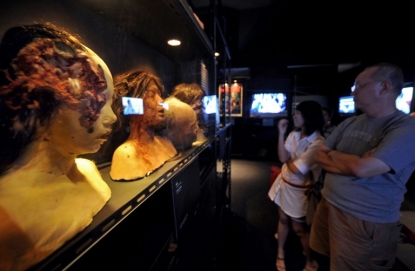 Ghosts from local Thai lore depicted at the Spirits Exhibition in Bangkok in 2010 (AFP Photo / Pornchai Kittiwongsakul)
Ghosts from local Thai lore depicted at the Spirits Exhibition in Bangkok in 2010 (AFP Photo / Pornchai Kittiwongsakul)Recently he caused an uproar by posting a picture of himself trampling on a row of little zebra statues that are supposed to protect drivers from ghosts, at a busy Bangkok junction known for fatal crashes.
The zebras were recently moved to a temple outside the city after a ceremony performed by a Buddhist monk, an event covered as everyday news in the national media.
"At the beginning, the workers were quite concerned," Supit Kraimak, head of the local sanitation department, tells Neung. “But after the monk chanted, they felt more comfortable about the job."
Hard for a Western journalist not to give in to sarcasm, faced with such a crunchy anecdote.
For the founder of “FuckGhosts”, believing in ghosts is backward-thinking, it holds back development and keeps the masses from asking difficult questions. He faults Thai Buddhist monks for going along with the popular beliefs, and sees it as a perversion of true Buddhism.
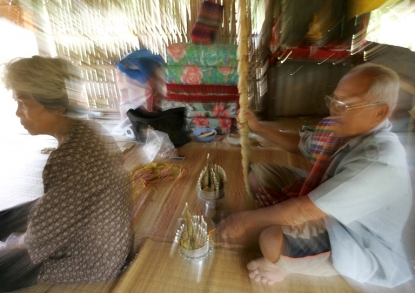 A 'ghostbuster' demonstrates catching ghosts in Phu Khieo, northeast Thailand, in 2007 (AFP Photo / Pornchai Kittiwongsakul)
A 'ghostbuster' demonstrates catching ghosts in Phu Khieo, northeast Thailand, in 2007 (AFP Photo / Pornchai Kittiwongsakul)I can see his point. The way monks profit financially from superstition is a real social issue here. And one we will be reporting on soon, with a look at the wealth of the country’s Buddhist clergy, a long way from its ethereal image in the West.
Extreme superstition
Just this morning, ghosts crop up again as I am interviewing a political analyst from a leading Bangkok university about the military junta that has held sway in the kingdom since last May’s coup d’etat, carried out in the name of defending the monarchy.
She tells me the extreme superstition of Thai people plays an important role in politics, making them more prone to seeking protection from a higher figure, whether in the form of a spirit or a sovereign with god-like powers.
Would Thai society still be the most conservative in Asia, as the academic believes it to be, if its people did not believe so deeply in ghosts?
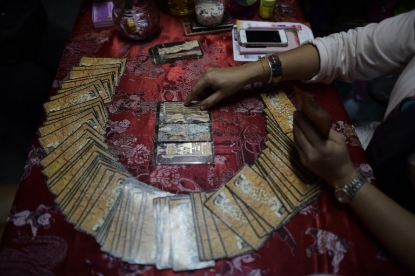 Telling the future at a Bangkok shrine to 'Nak' on January 15, 2015 (AFP Photo / Christophe Archambault)
Telling the future at a Bangkok shrine to 'Nak' on January 15, 2015 (AFP Photo / Christophe Archambault)Beyond such considerations, I find that this Thai need to believe in ghosts, as a way to mourn a loved one or simply to ward off the fear of dying, resonates with me on some deep level.
Before wrapping up our story, Neung and I sit down to watch some excerpts from a TV series about ghosts, followed by a chat show on the subject. A little girl three or four years old is seated amid a group of serious-looking men, among them the famous Kapol Thongplab.
On a set reminiscent of a Western political or literary talk show, the host explains that she somehow survived for three days alongside the dead body of her mother. The close-up shot of the child’s face seems to last forever.
"Who prepared your milk?" asks Kapol Thongplab. "Mummy," the little girl replies, to approving nods from the gathering.
And that is where I draw the line. My fascination with ghosts has reached its limit. And now, at last, I can write my story.
Delphine Thouvenot is AFP bureau chief in Bangkok
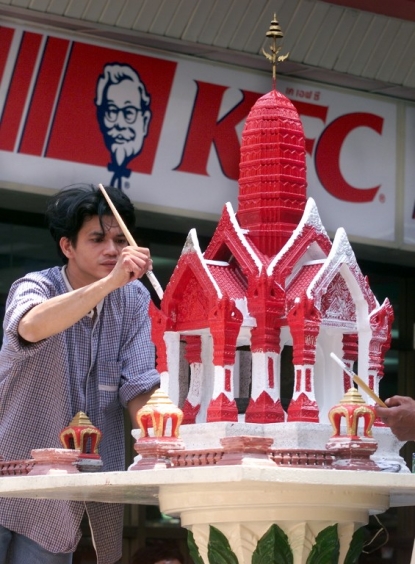 A worker paints a spirit house for the Thai New Year in 1999 (AFP Photo / Pornchai Kittiwongsakul)
A worker paints a spirit house for the Thai New Year in 1999 (AFP Photo / Pornchai Kittiwongsakul)

